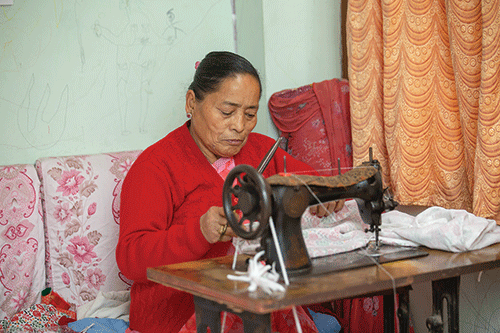Pickles are popular among Asians and each country and region has its own traditions and methods to make them. They serve as a flavor enhancer and they are typically eaten in small pieces with the rest of a meal. There are a wide variety of pickles and each is usually made with a mixture of fruits or vegetables that are chopped and marinated in oil or juice and a variety of spices, including chili pepper and salt. Nepali pickles are different from European, Chinese and Japanese varieties, as they are usually prepared in oil rather than in vinegar. Pickling in Nepal is an ancient art of food preservation, though the art had not seen the market until recently. Each household has its own recipe handed down over the generations. Nepali women take pride in their skill to prepare lip-smacking appetizers, but only a few have ventured to turn that into a profit-making business. And of the few, the name of Hajuri Bista stands apart from the rest.
Hajuri is a mother of two grown children, a holder of an Intermediate Certificate in Commerce, and lived in Paris for a several years with her family. After returning to Nepal, she felt restless and wanted to start something to keep occupied. With that thought in mind, in the early 1990s she came across an advertisement in a daily paper by the WEAN Cooperative, which stated its intention to organize women entrepreneurs and help them in marketing their home made products.
As she was interested to get into business, she enrolled herself with the Women Entrepreneurs Association of Nepal training and underwent an entrepreneurship program on food processing and preservation with other women. After the training, she joined up with her friend Kheshar Shrestha and started preparing and producing pickles of garlic, ginger, fish and meat with the assurance that WEAN would market them. During the training program they christened the new product ‘Navaras’, meaning ‘nine juices’.
Hajuri, along with her friend, worked in her own kitchen developing various recipes for the varieties of pickles that she wanted to produce. It took them almost three years just to work on the recipes that they now market. During the training program, the participating women agreed not to produce the same kinds of pickles that others were preparing.
Later, she also realized that in order to expand production they had to have larger space in which to prepare the pickles. Thus, Hajuri constructed a sizable kitchen behind her house in Dhobighat and moved the pickle production out of her home kitchen. She toiled for long hours and sold her products within the neighborhood at a low price and received positive feedback. She, along with other WEAN members, also attended business fairs and gradually introduced their products into the market. Steadily, Navaras gained recognition and has become very popular among Nepalese and expatriates, alike.
It has been more than 15 years since Hajuri started her home business and currently most grocery stores across the valley shelve more than 49 varieties of pickles marketed by WEAN. Of the total, Hajuri prepares 16 varieties including lapsi chutney and lapsi titaura (a popular dried fruit sweet), fish and buff pickles, sweet mango chutney, hot lemon pickle, whole garlic pickle, chili sauce, chili pickles, and radish and gundruk pickles (gundruk is a popular fermented dried vegetable).
Hajuri buys most of her ingredients for the pickles from the wholesale vegetable market in Kalimati and has a keen eye for quality produce. After so many years in the business, she has come in contact with leading vegetable and fruits vendors and she knows that she gets the best buys if she shops for the ingredients herself. The pickles are then hygienically prepared. Spices (masala) such as turmeric powder and chili powder are home prepared; others are taken to special mills after they are thoroughly cleaned in order to maintain the highest standards. Hajuri does not use any chemical preservatives and in order to control quality, she periodically seeks assistance and advice from the cooperative and from the Government Food Quality Control Department.
Her home industry employs more than 14 women, many of whom have been with her since the beginning. Some are full-time employees, and some work on a daily wage basis. They assist in all aspects from washing bottles to drying vegetables, from preparing different pickles to packaging and labeling the products. All products made by Hajuri are marketed by the WEAN Cooperative and are of export quality.
For her entrepreurship, Hajuri has received the ‘Women Management Recognition Award’, from the Management Association of Nepal, and the 2003 ‘Woman Entrepreneur of the Year’ awarded by Laxmi Bank. Hajuri wants to be recognized, however, not only as a business woman but as a social entrepreneur, as she feels that she has always given back to society what she learned and gained during her venture. And, indeed, Navaras has become a household name for quality pickles in Nepal. It was only possible because of enterprising women like Hajuri who dare to rise above the norm. Hajuri Bista resides at Dhobighat near Patan and is currently the Vice Chairperson of the WEAN Co-
operative.










